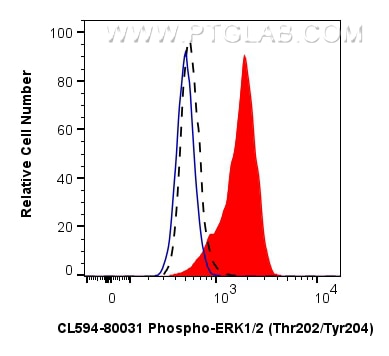Anticorps Recombinant de lapin anti-Phospho-ERK1/2 (Thr202/Tyr204)
Phospho-ERK1/2 (Thr202/Tyr204) Recombinant Antibody for FC (Intra)
Hôte / Isotype
Lapin / IgG
Réactivité testée
Humain, souris
Applications
FC (Intra)
Conjugaison
CoraLite®594 Fluorescent Dye
CloneNo.
8D12
N° de cat : CL594-80031
Synonymes
Galerie de données de validation
Applications testées
| Résultats positifs en FC (Intra) | cellules HepG2 traitées à la calyculine A, |
Dilution recommandée
| Application | Dilution |
|---|---|
| Flow Cytometry (FC) (INTRA) | FC (INTRA) : 0.50 ug per 10^6 cells in a 100 µl suspension |
| It is recommended that this reagent should be titrated in each testing system to obtain optimal results. | |
| Sample-dependent, check data in validation data gallery | |
Informations sur le produit
CL594-80031 cible Phospho-ERK1/2 (Thr202/Tyr204) dans les applications de FC (Intra) et montre une réactivité avec des échantillons Humain, souris
| Réactivité | Humain, souris |
| Hôte / Isotype | Lapin / IgG |
| Clonalité | Recombinant |
| Type | Anticorps |
| Immunogène | Peptide |
| Nom complet | mitogen-activated protein kinase 3 |
| Masse moléculaire calculée | 38-43 kDa |
| Poids moléculaire observé | 38-40 kDa |
| Numéro d’acquisition GenBank | NM_002746 |
| Symbole du gène | ERK1 |
| Identification du gène (NCBI) | 5595 |
| Conjugaison | CoraLite®594 Fluorescent Dye |
| Excitation/Emission maxima wavelengths | 588 nm / 604 nm |
| Forme | Liquide |
| Méthode de purification | Purification par protéine A |
| Tampon de stockage | PBS with 50% glycerol, 0.05% Proclin300, 0.5% BSA |
| Conditions de stockage | Stocker à -20 °C. Éviter toute exposition à la lumière. Stable pendant un an après l'expédition. L'aliquotage n'est pas nécessaire pour le stockage à -20oC Les 20ul contiennent 0,1% de BSA. |
Informations générales
Serine/threonine kinase which acts as an essential component of the MAP kinase signal transduction pathway. MAPK1/ERK2 and MAPK3/ERK1 are the 2 MAPKs which play an important role in the MAPK/ERK cascade. They participate also in a signaling cascade initiated by activated KIT and KITLG/SCF. Depending on the cellular context, the MAPK/ERK cascade mediates diverse biological functions such as cell growth, adhesion, survival and differentiation through the regulation of transcription, translation, cytoskeletal rearrangements. The MAPK/ERK cascade plays also a role in initiation and regulation of meiosis, mitosis, and postmitotic functions in differentiated cells by phosphorylating a number of transcription factors. MEK1 and MEK2 activate p44 and p42 through phosphorylation of activation loop residues Thr202/Tyr204 and Thr185/Tyr187, respectively. Several downstream targets of p44/42 have been identified, including p90RSK and the transcription factor Elk-1.


